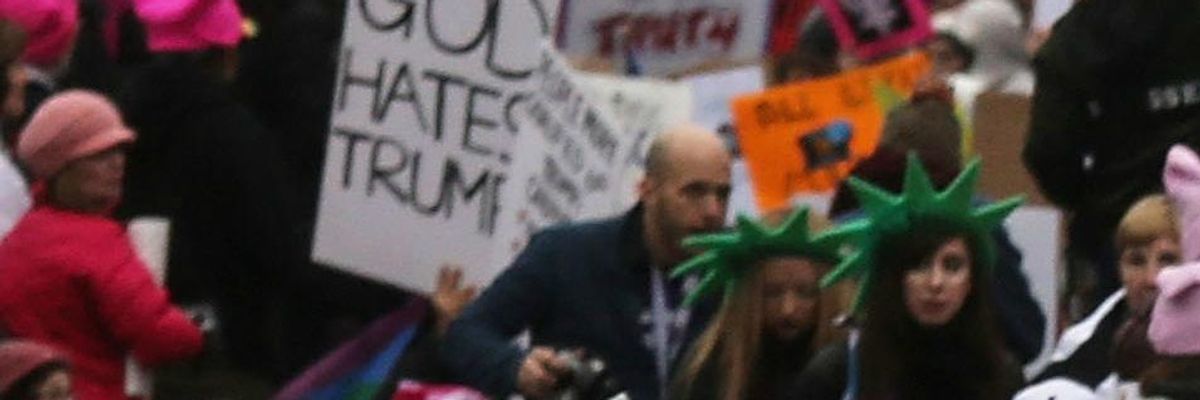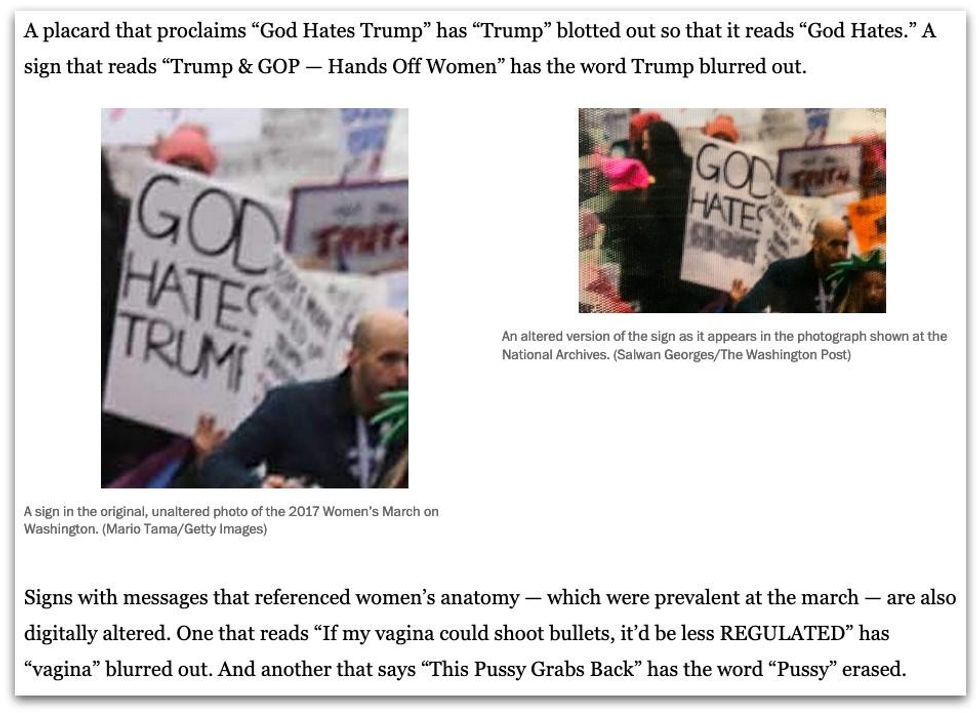

SUBSCRIBE TO OUR FREE NEWSLETTER
Daily news & progressive opinion—funded by the people, not the corporations—delivered straight to your inbox.
5
#000000
#FFFFFF
To donate by check, phone, or other method, see our More Ways to Give page.


Daily news & progressive opinion—funded by the people, not the corporations—delivered straight to your inbox.

A detail from an unaltered version of a photograph that the National Archive admitted it doctored to remove anti-Trump references. The picture was taken at the Women's March on Washington,D.C. on January 21, 2017. Massive crowds attended the anti-Trump rally a day after U.S. President Donald Trump was sworn in as the 45th U.S. president. (Photo: Mario Tama/Getty Images)
The ACLU was among the critics denouncing the National Archive on Saturday after it was reported the U.S. government agency admitted it had doctored photos of Women's March demonstrations that took place the day after President Donald Trump's inauguration in 2017.
Displayed for an exhibit celebrating the hundredth anniversary of the women's suffrage movement, the Washington Post reported Friday night that the Archives "acknowledged in a statement this week that it made multiple alterations to the photo of the 2017 Women's March showcased at the museum, blurring signs held by marchers that were critical of Trump."
Referencing the so-called "pussy hats" that became a proud symbol of the women-led anti-Trump protests that year, the Post notes that "words on signs that referenced women's anatomy were also blurred."
Louise Melling, deputy legal director of the ACLU, said in response that the decision to alter the photographs is inexcusable.
"The government can't airbrush history or erase women's bodies from it," Melling said. "It is the job of the National Archives to document history, not alter it to serve the president's ego."
From the Post:

While the Archives claimed they altered the photos only because the public exhibition would be host to many students and young children--and would never do so for archival purposes--Rice University historian Douglas Brinkley told the Post he didn't buy that excuse.
"There's no reason for the National Archives to ever digitally alter a historic photograph," Brinkley said. "If they don't want to use a specific image, then don't use it. But to confuse the public is reprehensible. The head of the Archives has to very quickly fix this damage. A lot of history is messy, and there's zero reason why the Archives can't be upfront about a photo from a women's march."
The revelations emerged just as women and their allies nationwide participated in the fourth annual Women's March to express their continued opposition to Trump and his administration.
On Saturday afternoon, the Archive admitted it made an error and issued a public apology.
"We apologize," the Archives said in a statement, "and will immediately start a thorough review of our exhibit policies and procedures so that this does not happen again."
ACLU's Melling, however, said more was needed.
"Apologizing is not enough," she said. "The National Archives must explain to the public why it even took the Orwellian step of trying to rewrite history and erasing women's bodies from it, as well as who ordered it."
Dear Common Dreams reader, The U.S. is on a fast track to authoritarianism like nothing I've ever seen. Meanwhile, corporate news outlets are utterly capitulating to Trump, twisting their coverage to avoid drawing his ire while lining up to stuff cash in his pockets. That's why I believe that Common Dreams is doing the best and most consequential reporting that we've ever done. Our small but mighty team is a progressive reporting powerhouse, covering the news every day that the corporate media never will. Our mission has always been simple: To inform. To inspire. And to ignite change for the common good. Now here's the key piece that I want all our readers to understand: None of this would be possible without your financial support. That's not just some fundraising cliche. It's the absolute and literal truth. We don't accept corporate advertising and never will. We don't have a paywall because we don't think people should be blocked from critical news based on their ability to pay. Everything we do is funded by the donations of readers like you. Will you donate now to help power the nonprofit, independent reporting of Common Dreams? Thank you for being a vital member of our community. Together, we can keep independent journalism alive when it’s needed most. - Craig Brown, Co-founder |
The ACLU was among the critics denouncing the National Archive on Saturday after it was reported the U.S. government agency admitted it had doctored photos of Women's March demonstrations that took place the day after President Donald Trump's inauguration in 2017.
Displayed for an exhibit celebrating the hundredth anniversary of the women's suffrage movement, the Washington Post reported Friday night that the Archives "acknowledged in a statement this week that it made multiple alterations to the photo of the 2017 Women's March showcased at the museum, blurring signs held by marchers that were critical of Trump."
Referencing the so-called "pussy hats" that became a proud symbol of the women-led anti-Trump protests that year, the Post notes that "words on signs that referenced women's anatomy were also blurred."
Louise Melling, deputy legal director of the ACLU, said in response that the decision to alter the photographs is inexcusable.
"The government can't airbrush history or erase women's bodies from it," Melling said. "It is the job of the National Archives to document history, not alter it to serve the president's ego."
From the Post:

While the Archives claimed they altered the photos only because the public exhibition would be host to many students and young children--and would never do so for archival purposes--Rice University historian Douglas Brinkley told the Post he didn't buy that excuse.
"There's no reason for the National Archives to ever digitally alter a historic photograph," Brinkley said. "If they don't want to use a specific image, then don't use it. But to confuse the public is reprehensible. The head of the Archives has to very quickly fix this damage. A lot of history is messy, and there's zero reason why the Archives can't be upfront about a photo from a women's march."
The revelations emerged just as women and their allies nationwide participated in the fourth annual Women's March to express their continued opposition to Trump and his administration.
On Saturday afternoon, the Archive admitted it made an error and issued a public apology.
"We apologize," the Archives said in a statement, "and will immediately start a thorough review of our exhibit policies and procedures so that this does not happen again."
ACLU's Melling, however, said more was needed.
"Apologizing is not enough," she said. "The National Archives must explain to the public why it even took the Orwellian step of trying to rewrite history and erasing women's bodies from it, as well as who ordered it."
The ACLU was among the critics denouncing the National Archive on Saturday after it was reported the U.S. government agency admitted it had doctored photos of Women's March demonstrations that took place the day after President Donald Trump's inauguration in 2017.
Displayed for an exhibit celebrating the hundredth anniversary of the women's suffrage movement, the Washington Post reported Friday night that the Archives "acknowledged in a statement this week that it made multiple alterations to the photo of the 2017 Women's March showcased at the museum, blurring signs held by marchers that were critical of Trump."
Referencing the so-called "pussy hats" that became a proud symbol of the women-led anti-Trump protests that year, the Post notes that "words on signs that referenced women's anatomy were also blurred."
Louise Melling, deputy legal director of the ACLU, said in response that the decision to alter the photographs is inexcusable.
"The government can't airbrush history or erase women's bodies from it," Melling said. "It is the job of the National Archives to document history, not alter it to serve the president's ego."
From the Post:

While the Archives claimed they altered the photos only because the public exhibition would be host to many students and young children--and would never do so for archival purposes--Rice University historian Douglas Brinkley told the Post he didn't buy that excuse.
"There's no reason for the National Archives to ever digitally alter a historic photograph," Brinkley said. "If they don't want to use a specific image, then don't use it. But to confuse the public is reprehensible. The head of the Archives has to very quickly fix this damage. A lot of history is messy, and there's zero reason why the Archives can't be upfront about a photo from a women's march."
The revelations emerged just as women and their allies nationwide participated in the fourth annual Women's March to express their continued opposition to Trump and his administration.
On Saturday afternoon, the Archive admitted it made an error and issued a public apology.
"We apologize," the Archives said in a statement, "and will immediately start a thorough review of our exhibit policies and procedures so that this does not happen again."
ACLU's Melling, however, said more was needed.
"Apologizing is not enough," she said. "The National Archives must explain to the public why it even took the Orwellian step of trying to rewrite history and erasing women's bodies from it, as well as who ordered it."